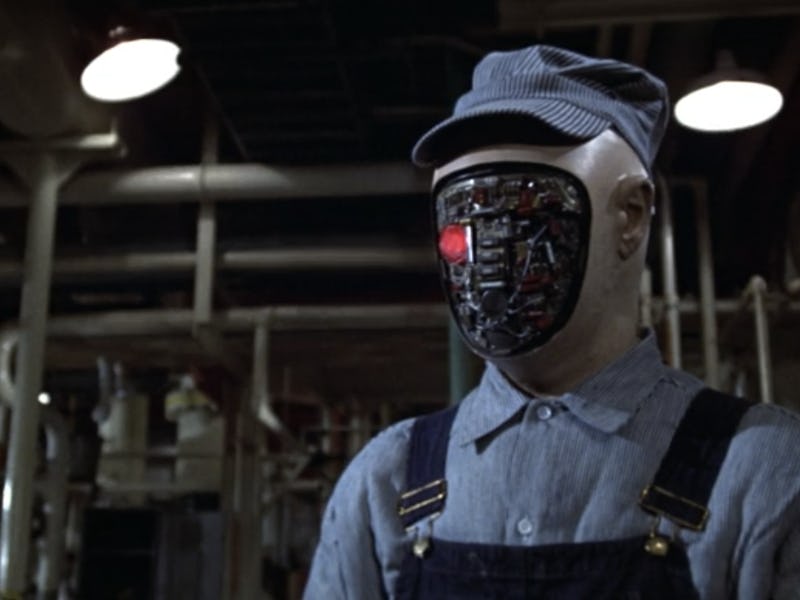How Delos in 'Futureworld' Could Shape HBO's 'Westworld'
"This place is one thing to the guests, another thing to the shareholders, and something completely different to management.”

HBO’s new sci-fi drama Westworld has many layers, most of which have yet to be revealed. Despite the fact that only two episodes of the show have been broadcast, we have some idea of where it’ll go because of its source material.
The premise — that humans are able to visit a robot-filled park in the near future to live out their fantasies — is based on Michael Crichton’s 1973 movie of the same name. Many people have looked at that movie for hints about where the show might go, but it would be a mistake to overlook the movie’s 1976 sequel, Futureworld.
The cinematic universe Crichton created featured a few different parks, including Roman World, Medieval World, and Futureworld, but don’t expect to see any of those anytime soon in the TV show. Westworld production designer Zack Grobler told Inverse, “For the first season, we only explore the Westworld. There’s talk about in the future seasons, if there’s more, that there will be a different world.”
It’s this kind of connection that has fans thinking the movies and TV show are linked beyond the fact that Bernard (Jeffrey Wright) mentioning the park hasn’t had a “critical failure” in over 30 years. A little peek at the cold storage level, which looked like an abandoned visitor’s center, featured a centerpiece globe with the “Delos” branding. The audience hasn’t learned anything about Delos, the name of the company behind the park in the movies, other than the fact that it has been featured in the show’s viral marketing. Otherwise, the shadowy organization has been playfully teased by being simply referred to as “Management.” Whoever the management is, their interests are inevitably nefarious, and only future episodes will tell.
When asked about these movie-to-TV links, Nolan told Entertainment Weekly the reference was “playful but not meant to be literal.” For the show, the playful but not literal connection to Delos could lie in Futureworld.
The sequel to the original movie is all about crisis management. Set two years after the first movie’s robo-mishap, Delos management invites a group of VIPs, including journalists and dignitaries, to try and drum up some good PR for their completely revamped park. Westworld lays in ruins, but a shiny new experience called Futureworld brings guests to what seems like a remote space station at the far reaches of the galaxy, to live out all their interplanetary pleasures.
The movie scraps the robots-run-amok conceit for something more sinister. Out to uncover the truth behind a tip given to him by a dead former Delos employee, Chuck Browning discovers a plan that would have made Invasion of the Robot Snatchers a solid alternate title.
It seems Delos has replaced all human workers with robots, to remove the human “flaw” that caused the first accident. Bad news: The automatons have wised up. Browning finds out the now-completely robotic company has invited everyone there so they can clone and then kill the rich and powerful new guests. By creating spot-on simulacra of world leaders and prominent media figures, they can ensure that nothing harms Delos’s interests.
The Westworld of the TV series has moved far past whatever incident caused that visitor’s center to be mysteriously abandoned 30 years ago and turned into cold storage for malfunctioning hosts. But problems will rear up again, and we’ll inevitably learn why. The show’s insistence that the limitlessness of human innovation will be our downfall by way of perfect humanoid robots is nothing new, but the equal insistence that the management is hiding some sort of game might align with the singularity that could have occurred in Futureworld were it not for Fonda’s plucky journo.
“This place is one thing to the guests, another thing to the shareholders, and something completely different to management,” says Theresa Cullen (Sidse Babett Knudsen) in the TV show’s premiere. What are management’s real interests here? For now, it’s complete existential domination.